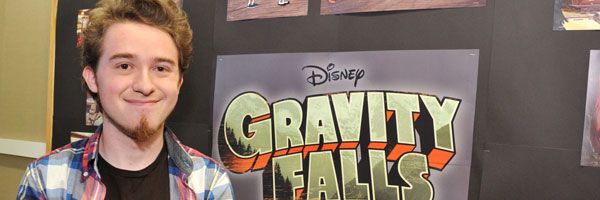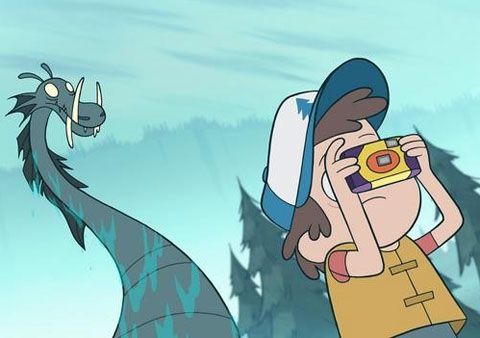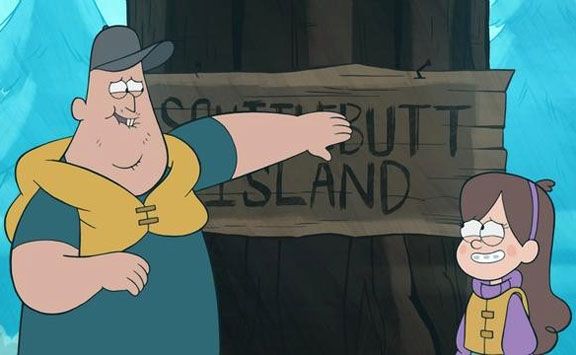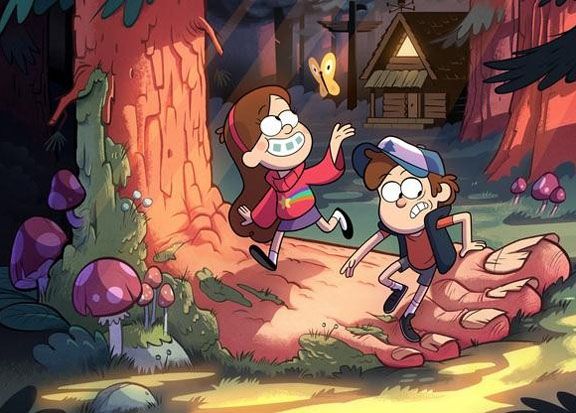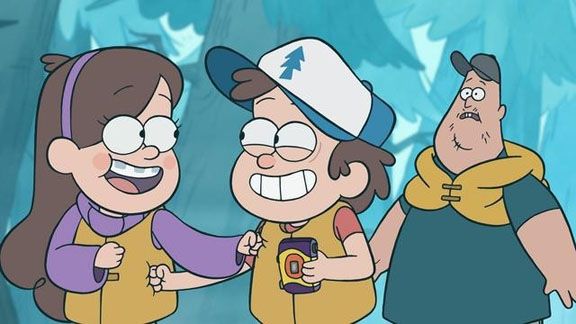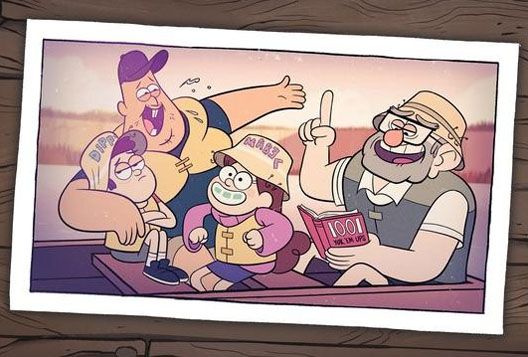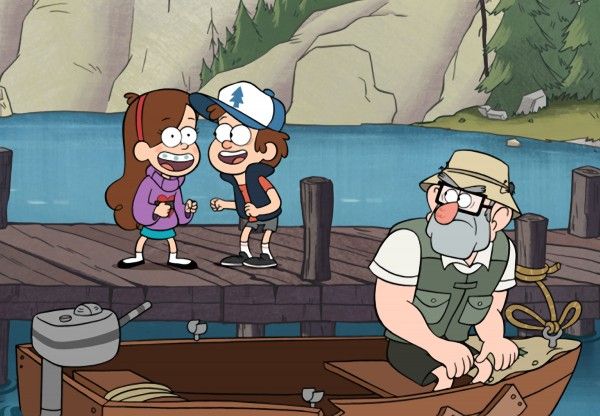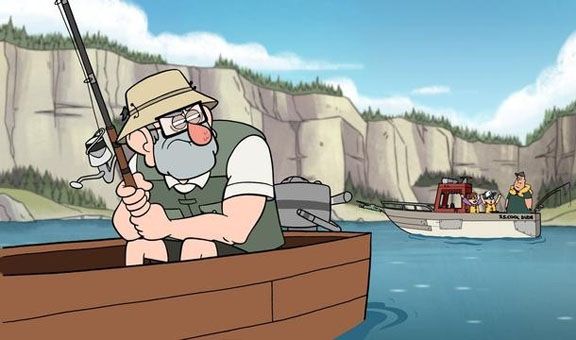The Disney Channel animated comedy series Gravity Falls, from creator/executive producer/writer/director Alex Hirsch, follows city kids Dipper (voiced by Jason Ritter) and Mabel Pines (voiced by Kristen Schaal), who are sent to spend the summer with their eccentric Great Uncle Stan, aka Grunkle Stan (voiced by Hirsch), who runs a tourist trap called The Mystery Shack in a remote northwestern town where nothing is what it seems. With creatures in the forest, monsters in the lake and time travel a possibility, things get very interesting for the twins as they quickly realize they need each other, in order to unlock the secrets of the quirky and mysterious town.
During this recent exclusive phone interview with Collider, CalArts graduate Alex Hirsch talked about what initially interested him in animation, how he ended up creating a show for the Disney Channel, what inspired the idea for Gravity Falls, how his relationship with his own twin sister growing up is really what’s at the heart of this show, the craziest summer experience that he’s personally had, the process for deciding the look of the show and characters, and how his family feels about being represented on the show. He also talked about what he loves about television animation, and how he’d love to branch out and do an adult animated series, at some point. Check out what he had to say after the jump.
Collider: How did this show come about for you, and what inspired the idea?
ALEX HIRSCH: I would say that these stories and these characters are something that I’ve had with me for a long time. The primary relationship in the series, between a brother who is kind of neurotic and obsessed with the paranormal and his goofy, wacky sister, came from my real life. I have a real twin sister, and I really was that neurotic kid who would carry 16 disposable cameras everywhere I went, and my sister really did wear wacky sweaters and have a different ridiculous crush, every week. The main relationship in the show is 100% mine, from my own childhood. And their uncle Stan is very much inspired by my grandpa Stan, who was a guy that told tall tales and would frequently mess with us to get a rise out of us. So, my family really inspired the characters on the show. In terms of the subject matter – mysteries and magic and the paranormal – just all came from the stuff I loved, when I was a kid. I loved The X-Files. I would still read the Weekly World News, back when that was in print, and the black and white tabloids with Batboy and Elvis. I always thought, if I was gonna make a kids show, I would want to make something that my own 12-year-old self would love. So, I put all that in a blender and stewed it together to create Gravity Falls.
How did you end up getting the series on the air?
HIRSCH: Disney approached me. I was working at Cartoon Network, at the time, on a show called Flapjack, and a Disney executive, Mike Moon, just cold-called me. He’d seen one of my student films and really liked it, and said, “Would you like to develop a show for the Disney Channel?” I hadn’t thought about developing a show for the Disney Channel, but I thought, “Maybe this is the place that would be interested in my weird Twin Peaks meets The Simpsons series. From the moment that I pitched it to them until now, I’ve just been really surprised and really grateful for the fact that they’ve embraced it. They never tinkered with it. They never said, “Add a talking race car,” or anything like that. They’ve respected and been excited by my vision, the whole way through. I’m very fortunate. I made a conscious choice, when I pitched this, that I wasn’t going to change it. If they had said, “That’s great, but what if they all rapped?,” I would say, “It’s a pleasure doing business with you. See you later!” I was very fortunate that the first studio I went to was at a place creatively where they wanted something different and they wanted something creator-driven.
How did you initially get interested in animation, and what was your first exposure to it that led you to want to pursue it, as a career?
HIRSCH: If you ask anyone in animation, how long they’ve been into animation, they’ll pretty much always tell you that it’s since they can remember, and I’m no exception. I’ve always just loved drawing and loved cartoons. Growing up, I loved Disney films, I loved The Simpsons, and I was a big fan of the comic strip Calvin & Hobbes and the way that they would have weird fantasy and then down-to-earth funny character comedy. As long as I could hold a pencil, I was drawing and telling stories and making jokes. I’ve just been lucky that no one ever stopped me, and now I can do that for a living. I went to CalArts, the animation college in Valencia, after high school, which was a really great experience. It’s expensive as all hell, but anyone who loves animation and wants a career in it [wants to go there]. I can speak to my experience and say that CalArts worked out very well for me. After CalArts, I went to Cartoon Network, and then came to Disney.
What was it about The Simpsons that you found so inspiring?
HIRSCH: I’ve always loved The Simpsons, just because it was really, really funny. As a kid, you love the characters. You know that the dad is dumb and frustrated, and you know that the boy is smarter than everyone else around him and is constantly getting into mischief. All the references and all the adult stuff goes over your head. But then, as you get older, you keep watching it and you keep discovering new references and new things. It gets better, over time. I feel like the best kids shows aren’t just for kids. The best kids shows have something in it for everyone. As you grow up, you’re increasingly proud to be a fan of the show, rather than getting to an age where you suddenly become embarrassed that you ever liked it because it’s only for seven-year-olds.
Would you say that this town is the place you wish you could have spent your summers, as a kid?
HIRSCH: That’s absolutely correct! I spent many summers up in a cabin with my twin sister and some of our relatives. Those summers were very long, and there was no TV and no internet connection. In the void left by technology and entertainment, my imagination grew to fill it. I would spend those summers imagining, “What if there was a monster in the lake? What if there were gnomes in the forest?” This is my chance to make all those childhood fantasies come true.
What was the craziest summer experience that you had, personally?
HIRSCH: The most relevant misadventure that I had, as a kid, is when I remember being pretty convinced that leprechauns were real and that I was going to catch one. I was pretty young, at that point, but I built a leprechaun trap that was made to look like a tiny hotel. There was a ramp where the leprechaun could walk into the hotel, see a Lego pot of gold on the other side, try to reach it, fall through a trap door, go through a tube, wind up in a biscuit tin, and be trapped. My mom, encouraging my madness, told me that the leprechaun might escape and that I needed a shot glass of whiskey down there to keep him occupied while he was in there. As you might imagine, I did not catch a leprechaun. But, I remember when I went to check on the trap, there was a hole burst through it with green glitter everywhere and the whiskey was missing. In my gut, I knew it was my mom. I knew my mom did that, so that I would feel like I caught a leprechaun. And yet, at the same time, I was so grateful that she did. I was so grateful that she knew that I believed this stuff enough, that she was willing to encourage it. Even though I didn’t catch a leprechaun, I got that split second of thinking that maybe I did. That was the closest thing I came to a close encounter.
How did you decide on the look of the animation for this and what the characters would look like?
HIRSCH: I went to art school with a lot of really, really talented friends, and one of my roommates actually became the art director on the series. He’s an immensely talented guy named Ian Worrel. When you’ve been to art school, there’s this temptation to get really fancy and really intricate, and try to draw the most complicated, difficult thing you can, and that’s often a dangerous temptation because it’s not funny or engaging. It’s obtuse. We definitely went through a development stage where we thought, “What if we made this look super avant garde?” And we ended up just coming back to something simple and something funny. I always loved the design of the Muppets on The Muppet Show. Even though Kermit can’t blink and he doesn’t have legs, he’s got those round eyes and skinny little arms, and because there’s so little there and he’s so simple, you fill in the blanks in your mind. I wanted these designs to be simple and iconic. The actual designs of the characters themselves are very inspired by myself and my sister. I always wore a baseball cap, wherever I went, because I didn’t like showering and I didn’t want people to see how messy my hair was. My sister would frequently wear these hideous, neon-colored sweaters.
How does your family feel about being represented on the show?
HIRSCH: They’re absolutely thrilled! There is a very specific, unique brand of rivalry that exists between twins. You’re always wondering who the Alpha twin is. I think my sister is both honored to be on my show and jealous that I have a show. But, because I owe so much of the comedy and the heart of the show to the character based on my sister, I’ve tried to give that character gifts that my sister would like. My sister always wanted a pet pig, so Mabel has a pet pig on the series. My sister always was obsessed with the band ‘NSync, so I got Lance Bass to do a voice on the show and I introduced him to my sister. So, I’ve been trying to make up for all the mockery that also exists on the series.
You have some great guest stars, but if you could get anyone to do a voice on the show and create a character for them, who would you want to have do it?
HIRSCH: My personal hero is Jon Stewart. If I had Jon Stewart doing the voice of just about anything, whether it was a wizard or a troll or just a postman, I would die happy. I’m also a huge fan of The Mythbusters. If The Mythbusters ever wanted to do a voice on the show, I think we could do a really funny episode where they attempted to debunk the town and then got terrified by what happened instead.
With something so personal to you and that you have such a connection to, was it weird to find people to voice Mabel and Dipper Pines?
HIRSCH: It is, but I got very lucky. The toughest role to cast was the role of the sister character, and I just lucked out with Kristen Schaal. She is incredible! She’s so funny. She’s such a great improviser. And unlike a lot of people who are funny, so also has this incredible voice that’s very unique and specific and has this youthfulness about it. It’s this ageless voice. She could be a woman, or she could be a kid. I just struck gold with her. Like many people, I saw her role as Mel on The Flight of the Conchords, and the moment I saw it, her stalkerish obsession with that band reminded me of my sister’s stalkerish obsession with many boys in bands, when we were kids. It was instant. I just lucked out with that. And Jason Ritter does the voice of Dipper. We did a pretty big casting process, and when I finally heard his audition and I held it up next to Kristen’s voice, I got the sense of a really fun chemistry and contrast between someone very spaced out and silly, and somebody tightly wound and neurotic. It just came together.
At what point did you decide that you also wanted to voice characters on the show? Was it always just a given that you would voice somebody?
HIRSCH: I never planned on it, but when you’re doing an animated series, you tend to pitch storyboards. You write a script and then you draw a comic version of that script and put it up on big boards, and then you pitch it to a big room of executives and writers. When you’re pitching, you tend to do the voices, and I always had a voice for Grunkle Stan and for Soos. They just became the voice that everyone associated with those characters, so strongly that when we started to actually cast, it just seemed natural that I continue what I was doing in those pitches on the series.
In doing a show that’s part adventure and part mystery, with comedy and drama, what are the biggest challenges in keeping everything in balance?
HIRSCH: In terms of balancing all the storytelling elements, that’s very difficult. Writing is the hardest part. I’m integrally involved in the writing of almost every episode. The most difficult thing with cracking a Gravity Falls story is trying to find something that has a character story, at the core of it, that’s about a relationship and is a small, petty, silly, funny, relatable human experience, and then find a good reason to connect it to strange, paranormal, magical, sci-fi elements. Every episode has that balance, but some are more successful than others. I think it gets better, as the series goes on, between the small and the mundane and the normal mixed with the big and the crazy. There’s one episode that I’m very happy with where Dipper wakes up one morning to discover that his sister Mabel is one millimeter taller than he is. They’ve always been the same height, their entire lives, because they’re twins, but now that she’s a millimeter taller, it seems like she’s the Alpha twin. It seems like she’s the best twin, and she starts gloating and it really goes to her head, so he finds a way to grow himself bigger than her. Of course, it’s Gravity Falls, so this goes horrifically awry, but that’s a story that I love because it is about this tiny thing being blown out of proportion. It’s about competition between siblings, and yet it also turns into this ridiculous adventure.
With this being a kids show, how do you go about deciding the level of violence you want to have on it?
HIRSCH: The concern about what’s too violent or what’s too scary is something that I just completely don’t let enter into my creative process. I feel like, if I spend a lot of time trying to worry about whether it will appeal to everyone and who will like it and who won’t, and I try to please everyone, I’ll just spread myself too thin and lose my mind. So, I start from a place of, “Will I like this? Would I think this is funny?” I look to myself now and to myself as a kid and say, “If I was hanging out with my 12-year-old self, would we both get a kick out of this?” That’s as far as I go, in terms of worrying about the audience.
Now that you’ve done this show, are you hoping to continue to develop and create animated series, or are you also hoping to branch out to animated features or live-action?
HIRSCH: I absolutely love television. I recently interned at Pixar and they actually offered me a job as a story artist there, but I’m just not as interested in features. What’s so great about TV is that I can tell 20 stories in a year. If I was working at a feature studio, I’d tell 1% of someone else’s story, over the course of four years. In terms of creative engagement, I just love being able to produce, produce, produce. You don’t always get it perfect, but it has much more of an improvisational element, and you learn. It’s sort of like boot camp, in TV. You learn what works and what doesn’t work. If you screw something up, next week’s show is right on your heels, so you can do it better the next time. That’s really fun and really exciting to me. After doing this season – and it’s been so fun, but it’s also been so challenging – I kind of feel like I could do anything. I could imagine doing a feature, sometime down the line. I’ve really enjoyed doing this kids series, but I would love, at some point, to do a series that’s on one of the adult networks and talk about things that I can’t talk about on the Disney Channel. But for now, I’m very happy to be here, and I’m very happy to be working on this series.
Gravity Falls airs on Friday nights on the Disney Channel.

